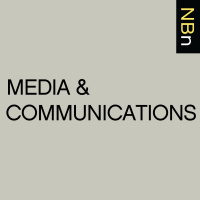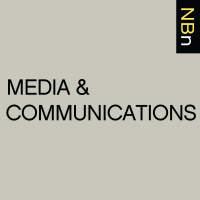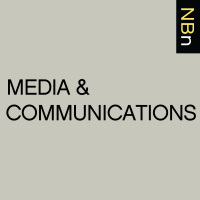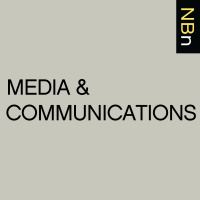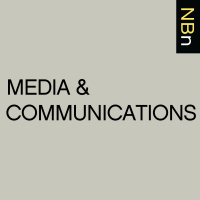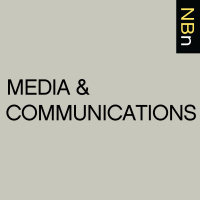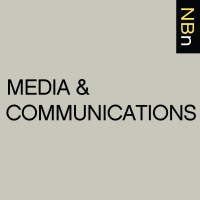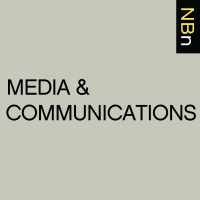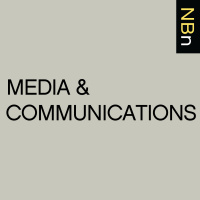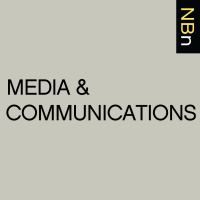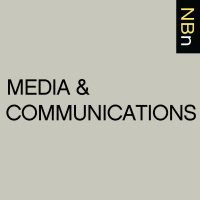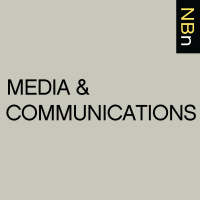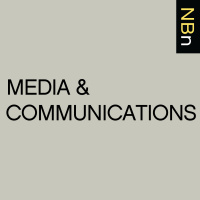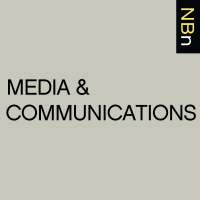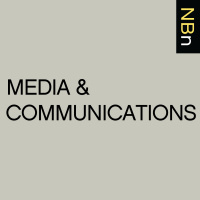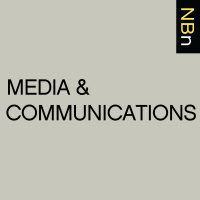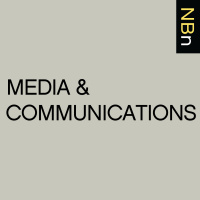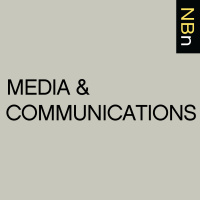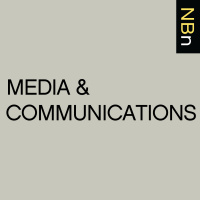Synopsis
Interviews with Scholars of Media and Communications about their New Books
Episodes
-
Deborah Jaramillo, “The Television Code: Regulating the Screen to Safeguard the Industry” (U Texas Press, 2018)
09/10/2018 Duration: 51minIf you watch old movies or study film history, you may know that early 20th-century Hollywood operated under the Motion Picture Production Code, which dictated what could and couldn’t be portrayed onscreen. But did you know that television had a code of its own? Its story has never been told at length until now. Deborah Jaramillo, Associate Professor of Film and Television at Boston University, is the author of a new book called The Television Code: Regulating the Screen to Safeguard the Industry (University of Texas Press, 2018). Jaramillo tells the story of a young television industry’s attempt to police itself on controversial questions about content, fending off pressure from government regulators and finicky viewers. Jaramillo explores whether the federal government could have played a stronger role at this formative time in the industry, and what the code did and didn’t accomplish in its three decades of existence. Learn more about your ad choices. Visit megaphone.fm/adchoices
-
P.W. Singer and Emerson T. Brooking, “LikeWar: The Weaponization of Social Media” (Houghton Mifflin Harcourt, 2018)
02/10/2018 Duration: 50minLikeWar: The Weaponization of Social Media (Houghton Mifflin Harcourt, 2018), by P.W. Singer and Emerson T. Brooking, outlines the history of social media platforms and their use in popular culture and modern conflict. The authors make comparisons to previous technological advancements (such as telegraph and radio) and connect the use of social media to a Clausewitzian view of war. The use of social media by insurgents, criminal organizations, and nation-states raises questions about whether the medium is the message or if new communication channels are propaganda in another form. Beth Windisch is a national security practitioner. You can tweet her @bethwindisch. Learn more about your ad choices. Visit megaphone.fm/adchoices
-
Allyson Jule, “Speaking Up: Understanding Language and Gender” (Multilingual Matters, 2018)
28/09/2018 Duration: 47minIn a time where concepts such as gender pronouns, sexual assault and harassment, and toxic masculinity are entering and shaping public discourse, knowing the ways in which gender and language interact is key. In her new book, Speaking Up: Understanding Language and Gender (Multilingual Matters, 2018), Dr. Allyson Jule describes the ways in which gender and language intersect in various parts of life. Jule examines gender and language in media and technology, education, the workplace, religion, and relationships. Each chapter offers the latest research in that area as well as major works that preceded our current time. Jule provides an excellent primer that could be used at all levels of higher education along with being accessible to the general public, which makes this an outstanding contribution to the field. Learn more about your ad choices. Visit megaphone.fm/adchoices
-
Lorenzo Zamponi, “Social Movements, Memory and Media: Narrative in Action in the Italian and Spanish Student Movements” (Palgrave, 2018)
25/09/2018 Duration: 36minHow do social movements remember the past? How do collective memories affect their current strategic choices? In his book Social Movements, Memory and Media: Narrative in Action in the Italian and Spanish Student Movements (Palgrave, 2018), Lorenzo Zamponi provides an answer to these questions by analyzing the representations of specific episodes related to the Italian and Spanish student movements of the 1960s and 1970s, and the recollection of those events by current student activists. By bridging the disciplines of memory studies and social movement studies, Lorenzo makes a significant contribution to our understanding of how cultural factors shape political action. Collective memories can serve as a way of legitimation and mobilization to social movements, but they can also limit their strategic choices by imposing certain past identities and contentious repertoires. Researchers from all disciplines interested in the intersect between memory and social movement studies are encouraged to answer to the Ca
-
J. Lester, C. Lochmiller, and R. Gabriel, “Discursive Perspectives on Education Policy and Implementation” (Palgrave Macmillan, 2017)
13/09/2018 Duration: 51minThe study of education policy is a scholarly field that sheds light on important debates and controversies revolving around education policy and its implementation. In this episode, we will be talking with three scholars who have made substantial contributions to this field by introducing an innovative perspective to the studies of educational policy—the discursive perspectives. In their new edited volume, Discursive Perspectives on Education Policy and Implementation (Palgrave Macmillan, 2017), editors Jessica Lester, Chad Lochmiller, and Rachael Gabriel, together with other contributors of the book, argue that we should pay close attention to how language is used as a mediation in the entire process of education policy conceptualization and implementation. The book offers compelling and diverse examples to demonstrate how researchers interested in different aspects of policy studies may employ language-based methodologies to enrich our understanding of crucial issues in the realm of policymaking. Thoughtful
-
Denise Y. Ho, “Curating Revolution: Politics on Display in Mao’s China” (Cambridge UP, 2017)
27/08/2018 Duration: 01h07min“In Mao’s China, to curate revolution was to make it material.” Denise Y. Ho’s new book explores this premise in a masterful account of exhibitionary culture in the Mao period (1949-1976) and beyond. Curating Revolution: Politics on Display in Mao’s China (Cambridge University Press, 2017) argues that “curating revolution taught people how to take part in revolution,” and it develops that argument in a series of case studies that take readers into the local context of museums, revolutionary monuments, model neighborhoods, and more in Shanghai, while paying careful attention to the ways that the Shanghai case resonates with the larger scope of Maoist China as a whole. It’s a study that will be of interest to readers of Chinese history, museum studies, material cultures, and more. Enjoy! Carla Nappi is the Andrew W. Mellon Chair in the Department of History at the University of Pittsburgh. You can learn more about her and her work here. Learn more about your ad choices. Visit megaphone.fm/adchoices
-
Ben Epstein, “The Only Constant is Change: Technology, Political Communication, and Innovation Over Time” (Oxford UP, 2018)
22/08/2018 Duration: 46minBen Epstein’s new book, The Only Constant is Change: Technology, Political Communication, and Innovation over Time (Oxford University Press, 2018), traces communication changes and innovations in the United States from the time of the Founding to the present, while also exploring how and where innovative use of communication becomes viable for political actors. Epstein connects a number of threads within the book, including a qualitative approach to communications studies that makes use of the American Political Development, or APD, framework as the structure to explore the disruptions in technology that allow for new forms of political communication operations to come forward and for political actors to choose to make use of these innovative forms for communication. Making central claims about how technological and political forces disrupt political communication activity and how these disruptions lead to new political communication orders, Epstein also examines who makes the most use of new information and
-
Mary E. Stuckey, “Political Vocabularies: FDR, The Clergy Letters, and the Elements of Political Argument” (Michigan State UP, 2018)
20/08/2018 Duration: 51minMary E. Stuckey’s new book, Political Vocabularies: FDR, The Clergy Letters, and the Elements of Political Argument (Michigan State University Press, 2018), is a fascinating and engaging investigation of an early period during the Roosevelt Administration that provides the reader with a broad and expansive understanding of different aspects of presidential politics, political rhetoric, communication between elected officials and constituents, and the shifting perceptions of the role of the executive in the American political system. This snapshot in time, in this case, 1935, provides a much bigger picture of power, political change, and the sense of the country as a whole. Stuckey integrates aspects of these letters into her analysis as she explores rhetorical authority and differing political vocabularies as seen while the power and structural dynamics in the United States shifted during this period. She also examines how these letters between clergy members and the president provide readers with an underst
-
Paul Offit, “Bad Advice: Or Why Celebrities, Politicians, and Activists Aren’t Your Best Source of Health Information” (Columbia UP, 2018)
17/08/2018 Duration: 50minYou should never trust celebrities, politicians, or activists for health information. Why? Because they are not scientists! Scientists often cannot compete with celebrities when it comes to charm or evoking emotion. Science is complex and often cannot provide the easy “soundbite” worthy answers that celebrities and politicians truly comprehend. Americans are flooded with misleading or incorrect claims about health risks. In his book Bad Advice: Or Why Celebrities, Politicians, and Activists Aren’t Your Best Source of Health Information (Columbia University Press, 2018), Dr. Paul Offit sets the record straight. In this book, Dr. Offit shares his advice from his years of experience battling misinformation in science and public health. He has often found himself in the crosshairs of the anti-vaccine movement and other pseudoscience groups. He has received a significant amount of hate mail and even death threats for speaking out in the name of good science and the health of mankind. Bad science isn’t just wrong,
-
John H. McWhorter, “The Creole Debate” (Cambridge UP, 2018)
14/08/2018 Duration: 01h13minJohn H. McWhorter is Associate Professor of English and Comparative Literature at Columbia University. He has written academic books on creole linguistics, including the book we’ll be talking about today, but also a number of popular books on language (including The Power of Babel), and black identity in the United States. He is a regular columnist for several US broadsheets; he’s a two-time TED talker; and he has a weekly podcast dealing with issues related to language called Lexicon Valley which is worth checking out if you’re listening to New Books in Language. In this interview, McWhorter discusses his recent book The Creole Debate (Cambridge University Press, 2018). Making the case that prominent scholars in creole studies have systematically mischaracterized the nature of creole languages, McWhorter calls for a more intellectually honest engagement with the empirical evidence, both from “syntactocentric” formal linguists, and from creolists concerned that treating creoles as typologically distinct is t
-
Yves Citton, “The Ecology of Attention” (Polity Press, 2017)
13/08/2018 Duration: 01h10minWe are arguably living in the midst of a form of economy where attention has become a key resource and value, labor, class, and currency are being reconfigured as a result. But how is this happening, what are the consequences, and is “economy” necessarily the most productive frame in which to understand these transformations in attention and distraction? Yves Citton’s new book explores these questions in a fascinating study of attention as economy, ecology, and “echology” (with the last taking on resonances of the notion of the echo). The Ecology of Attention (tr. Barnaby Norman) (Polity Press, 2017) looks carefully at attention-related phenomena emergent at a number of scales and argues throughout that there are high stakes for how we understand and work with these phenomena: for teaching, performance, the environment, and liberty itself. It’s a clear and compelling book about an important topic, and it will be of interest to a wide readership. Enjoy the conversation! Carla Nappi is the Andrew W. Mellon C
-
Maria Repnikova, “Media Politics in China: Improvising Power under Authoritarianism” (Cambridge UP, 2017)
30/07/2018 Duration: 01h01minDespite its extraordinary diversity, life in the People’s Republic of China is all too often viewed mainly through the lens of politics, with dynamics of top-down coercion and bottom-up resistance seen to predominate. Such a binary framing is particularly often applied to analyses of the country’s media which is understood in terms of mouthpieces of the party-state or vanishingly rare dissident voices. Yet as Maria Repnikova lucidly shows in her book Media Politics in China: Improvising Power under Authoritarianism (Cambridge University Press, 2017) there may be much more at play here than a straightforward cleavage between collaboration and resistance. Through discussion of the work of ‘critical journalists’ and their interactions with officialdom, Repnikova paints a rich and provocative picture of the flexible, creative, if nevertheless precarious, nature of state-media interactions whose implications go far beyond the media sphere. Repnikova suggests that journalistic ‘change-makers within the system’ (to
-
Martin Shuster, “New Television: The Aesthetics and Politics of a Genre” (U Chicago Press, 2017)
19/07/2018 Duration: 54minHow should we understand our new golden age of television? In New Television: The Aesthetics and Politics of a Genre (University of Chicago Press, 2017), Martin Shuster, Director of Judaic Studies and Assistant Professor at Goucher College, interrogates New Television and offers both a defense and critique. Drawing on the work of the late Stanley Cavell, along with others including Hannah Arendt, the book explores the ontology of New Television, the medium of the screen, and the nature of storytelling. New Television has a vast range of examples, including chapters specifically focused on The Wire, Weeds and Justified. Along with detailed aesthetic philosophical discussion of each program, the book ultimately poses the problem of the politics of New Television, questioning the extent to which it offers critical, emancipatory, or regressive contributions to our understanding of modern life. The book is essential reading for anyone watching television, and also those who are not! Learn more about your ad choice
-
Kelsy Burke, “Christians Under Covers: Evangelicals and Sexual Pleasure on the Internet” (U California Press, 2016)
17/07/2018 Duration: 41minHow do we conceptualize religious conservatives and their relationship with sex? And how do Christians use digital media for sexual knowledge and pleasure? In her new book, Christians Under Covers: Evangelicals and Sexual Pleasure on the Internet (University of California Press, 2016), Kelsy Burke tackles these issues and more. Using “virtual ethnography” consisting of analysis of website content and interviews with website users online, Burke explores the ways in which evangelicals maintain commitment to God while expressing and learning about themselves sexually online. This book uses a feminist and queer perspective to understand this population and many of sociology’s great topics, including power, inequality, and gender. Respondents tend to think about themselves in terms of what Burke refers to as marital exceptionalism – that if these conversations and acts are taking place within a heterosexual marriage, then they are okay. She compares and contrasts men and women’s experiences on these websites, find
-
Daniel Hopkins, “The Increasingly United States: How and Why American Political Behavior Nationalized” (U Chicago Press, 2018)
04/07/2018 Duration: 32minWill voters this fall be voting for or against Donald Trump, even though he isn’t on the ballot? Will they be voting on national issues, such as immigration or relations with North Korea, even when the election is for city council or mayor? If all politics is ultimately local, then the answer should be no. Instead, most assume that national issues will dominate vote choice up and down the ballot in 2018. For Daniel Hopkins, this is not a new phenomenon: the United States has been nationalizing for a long time, and political behavior has long reflected it. Hopkins is the author of The Increasingly United States: How and Why American Political Behavior Nationalized (University of Chicago Press, 2018). He is associate professor in the Political Science Department at the University of Pennsylvania. In his new book, Hopkins marshals an incredible amount of data, from reanalysis of existing data to newly collected surveys to original experiments. From this mound of data, he shows how US politics has nationalized a
-
Eric Miller, “The Rhetoric of Religious Freedom in the United States” (Lexington Books, 2017)
15/06/2018 Duration: 24minThe recent Supreme Court Masterpiece Cakeshop ruling showed the on-going debate between religious conservatives and advocates of LGBTQ rights. Much of this debate has been about the definition of religious freedom and how to balance religious rights against other important individual rights. This is the topic of the new book The Rhetoric of Religious Freedom in the United States (Lexington Books, 2017). Eric Miller has brought together over a dozen scholars to consider the language used to argue over these rights claims. Chapters focus on everything from Conservative Evangelicals to environmental policy to Fundamentalists response to Donald Trump. Eric C. Miller is assistant professor of communication studies at Bloomsburg University of Pennsylvania. Learn more about your ad choices. Visit megaphone.fm/adchoices
-
Yaron Peleg, “Directed by God: Jewishness in Contemporary Israeli Film and Television” (University of Texas Press, 2016)
12/06/2018 Duration: 47minAs part of its effort to forge a new secular Jewish nation, the nascent Israeli state tried to limit Jewish religiosity. However, with the steady growth of the ultraorthodox community and the expansion of the settler community, Israeli society is becoming increasingly religious. Although the arrival of religious discourse in Israeli politics has long been noticed, its cultural development has rarely been addressed. In his new book Directed by God: Jewishness in Contemporary Israeli Film and Television (University of Texas Press, 2016), Yaron Peleg explores how the country’s popular media, principally film and television, reflect this transformation. In doing so, it examines the changing nature of Zionism and the place of Judaism within it. Yaacov Yadgar is the Stanley Lewis Professor of Israel Studies at the University of Oxford. His most recent book is Sovereign Jews: Israel, Zionism and Judaism (SUNY Press, 2017). You can read more of Yadgar’s work here. Learn more about your ad choices. Visit megaphone.
-
Hala Auji, “Printing Arab Modernity: Book Culture and the American Press in Nineteenth-Century Beirut” (Brill, 2016)
05/06/2018 Duration: 51minIn Middle Eastern history, the printing press has been both over- and under-assigned significance as an agent of social change. Hala Auji’s Printing Arab Modernity: Book Culture and the American Press in Nineteenth-Century Beirut (Brill, 2016) is not only a history of the American Protestant mission’s Arabic press in Beirut, which printed books for Ottoman readers during the 19th century, but a window into the world of Arabic printing at large. Auji uses art history to chart the transition between manuscripts and printed books, using a deep appreciation for Islamic art and book-production to highlight rupture and continuity. Text and non-textual elements are used to tell a story that was not local simply to Beirut, but had connections to the entire region and the development of printing in Arabic-language script at large. Part book-history, part art history, part intellectual history, Printing Arab Modernity ebbs between lithography and typography to tell an essential narrative of modern Middle Eastern histo
-
Roderick P. Hart, “Civic Hope: How Ordinary Americans Keep Democracy Alive” (Cambridge UP, 2018)
24/05/2018 Duration: 40minTo find out what Americans really think about their government, University of Texas-Austin Professor Roderick P. Hart read and analyzed approximately 10,000 letters to the editor, from 12 “ordinary” cities, written between 1948 and the present. In Civic Hope: How Ordinary Americans Keep Democracy Alive (Cambridge University Press, 2018), Hart argues these letter writers are essential because “[c]reating and sustaining a culture of argument at the grassroots level” is what makes “democracy flourish.” Despite the sometimes cantankerous nature of letter writers, Hart praises their commitment to participating in a public dialogue. He notes the importance of sharing opinions in local newspapers in one’s own name, where neighbors can see them and respond to them, aiding communal understanding. But Hart also sees in his research a decline over the past several decades in “Oppositional Literacy,” the understanding of opposing views, possibly fed by “hyper-partisanship” in non-local online discourse. Nevertheless, “Ci
-
Erik Mueggler, “Songs for Dead Parents: Corpse, Text, and World in Southwest China” (U Chicago Press, 2017)
21/05/2018 Duration: 01h05minThe Lòlop’ò of Southwest China’s Yunnan Province have a folktale in which they, Han Chinese, and Tibetans were given the technology of writing. The Han man was wealthy, purchased paper, and wrote on paper. And so the Han continue to have writing today. The Tibetan man wrote on an animal hide, and so the Tibetans now have writing as well. The Lòlop’ò man, being poor, wrote on buckwheat pancakes. He ate the pancakes on the way home, and the Lòlop’ò now keep their texts orally among a group of ritual specialists. In Erik Mueggler’s Songs for Dead Parents: Corpse, Text, and World in Southwest China (University of Chicago Press, 2017), Lòlop’ò oral literature and Han Chinese writing feature prominently in local “work on the dead.” For the Lòlop’ò, one’s familial ancestors, and non-familial ancestors are present in the world, and people maintain complex intimate relations with them that are not constrained by death. These relations find expression in rituals in which souls are given material body and then dispersed

